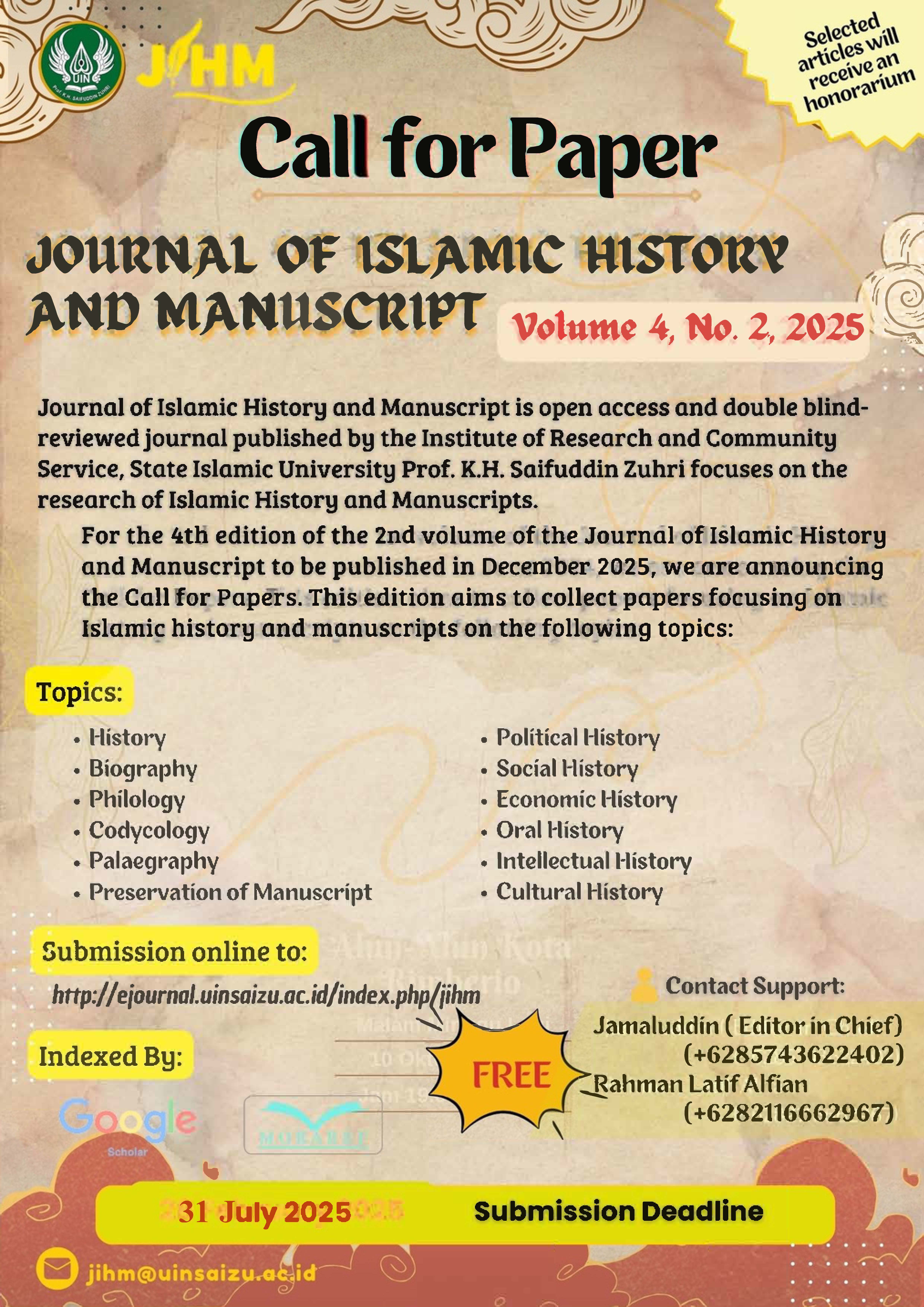The The Political Relevance of Kartosuwiryo's Hijrah in the Global Context: Inspiration for Struggle in the Modern Era
DOI:
https://doi.org/10.24090/jihm.v4i1.13073Keywords:
Kartosuwiryo, Hijrah Politics, The Islamic State of Indonesia, Modern EraAbstract
Sekarmadji Maridjan Kartosuwiryo, familiarly called Kartosuwiryo, was the proclamator of the Islamic State of Indonesia. Kartosuwiryo believed Islam had a significant influence on every aspect of human life. The idea he wanted to realize was establishing the Islamic State of Indonesia, and hijrah politics was one of Kartosuwiryo's efforts toward the Islamic State of Indonesia. This article will analyze the basic concept of the hijrah political thought of Sekarmadji Maridjan Kartosuwiryo in establishing the Islamic State of Indonesia. The method used is qualitative, with literature studies such as books, journals, articles, and others. In addition, the author uses a historical approach and the construction of a day approach to explore information about Kartosuwiryo's hijrah politics. The results showed that Kartosuwiryo's hijrah politics was an Islamic-based struggle to build a state with laws and order based on the Qur'an. This concept remains relevant to address modern global challenges, such as migration, religious identity, and cross-cultural solidarity. In addition, this article also shows that the politics of hijrah is not only a strategy of resistance against colonialism but also has relevance in the modern era. Hijrah can be translated as an effort to create social transformation, such as community empowerment, cross-cultural solidarity, and humane management of global migration. By adapting to digital technology, the concept of hijrah can also encourage interfaith dialogue and spread social justice values in an increasingly connected world.References
Ahyuni, A. (2019). Konteks Hijrah Nabi Muhammad Saw dari Mekkah ke Madinah Melalui Dakwah Individual ke Penguatan Masyarakat. Mamba’ul ’Ulum, 15(2), 1–7. https://doi.org/10.54090/mu.18
Al-Chaidar. (1999). Pemikiran Politik Proklamator Negara Islam Indonesia S.M Kartosuwiryo: Fakta dan Data Sejarah Darul Islam. Yogyakarta: Penerbit Darul Falah.
Awwas, I. S. (2008). Jejak Jihad Kartosuwiryo: Mengungkap fakta yang didustakan. Yogyakarta: Uswah.
Baiahaki, A. I. (2019). Peran Kartosuwiryo dalam Pembentukan Negara Islam Indonesia 1947-1962 [Skripsi]. Universitas Islam Negeri Sunan Ampel.
Diningrat, B. R. (2021). Potret Gerakan Sosial Keagamaan Negara Islam Indonesia Fillah di Kabupaten Garut. TEMALI: Jurnal Pembangunan Sosial, 4(1), 42–58. https://doi.org/10.15575/jt.v4i1.11536.
Farhan, A. (2017). Representasi Tokoh Sejarah S.M. Kartosoewirjo dalam Novel Kartosoewirjo: Pahlawan atau Teroris? Karya Damien Dematra dan Rancangan Pembelajaranya [Skripsi]. Universitas Lampung.
Formichi, C. (2012). Islam and The Making of The Nation: Kartosoewiryo and Political Islam in 20th Century Indonesia. Leiden: KITLV Press.
Holk, H. D. (1995). Darul Islam dan Kartosuwiryo. Yogyakarta: Pustaka Sinar Harapan.
Huda, M. D. (2018). Konflik Ideologi Soekarno dan Kartosoewirjo, 1923-1962. AVATARA, e-Journal Pendidikan Sejarah, 6(3), 88–97.
Kahin, A. (2012). Islam, Nationalism, and Democracy: Political biography of Mohammad Natsir. Singapura: National University of Singapore Press.
Nafi’, M. Z. (2022). Wacana Gerakan Hijrah di Website Keislaman Indonesia (Studi Kasus Islami.co, Ibtimess.id dan Hidayatullah.com) [Tesis]. Sekolah Pascasarjana UIN Syarif Hidayatullah Jakarta.
Prapta, F. I. (2024). H.O.S. Tjokroaminoto dan Sarekat Islam dalam Representasi Hijrah-Perjalanan Tjokroaminoto: Tinjauan Teori Praksis Sosial dan Kapital Budaya Pierre Bourdieu. SULUK: Jurnal Bahasa, Sastra, dan Budaya, 6(1), 68–87. https://doi.org/10.15642/suluk.2024.6.1.68-87
Putri, R. (2023). Perlindungan Pengungsi dalam Perspektif Al-Qur’an [Tesis]. Institut PTIQ Jakarta.
Putri, S. A. R. (2021). Hijrah Sebagai Gaya Hidup Generasi Digital Native Urban. Jurnal Komunika Islamika: Jurnal Ilmu Komunikasi dan Kajian Islam, 8(2), 64–76.
Ridlo, M. (2019). Negara Islam Indonesia dan Kartosuwiryo (Konsepsi Gerakan Politik, Militer, dan Agama). HUMANISTIKA Jurnal Keislaman, 5(2), 134–155. https://doi.org/DOI:10.36835/humanistika.v5i2.45
Risman. (2019). Strategi Politik Sekarmadji Maridjan Kartosuwiryo dalam Mendirikan Negara Islam Indonesia (NII) Sebelum dan Sesudah Kemerdekaan [Skripsi]. Universitas Islam Negeri Syarif Hidayatullah Jakarta.
Rudiansyah. (2021). Analisis Pemikiran Politik Sekarmadji Maridjan Kartosoewirjo Tentang Negara Islam Indonesia [Tesis]. UIN Sumatra Utara.
Santoso, L. (2014). Sejarah Terlengkap Gerakan Separatis Islam. Yogyakarta: Palapa.
Sanusi, A., Anisah, A., & Rosidin, D. N. (2022). Hijrah and Islamic Movement in Indonesia: Sekarmaji Marijan Kartosuwiryo’s Perspective. Buletin Al-Turas, 28(1), 19–30. https://doi.org/10.15408/bat.v28i1.21486
Subqi, A. (2021). Agama dan Perilaku Politik Kiai. Jawa Barat: Penerbit Perkumpulan Rumah Cemerlang Indonesia (PRCI).
Sudirman. (2008). Sejarah 2 Program Ilmu Sosial. Jakarta: Yudistira.
Suryana, R. (2019). Politik Hijrah Kartosuwiryo; Menuju Negara Islam Indonesia. Journal of Islamic Civilization, 1(2), 83–95. https://doi.org/10.33086/jic.v1i2.1212.
Syaharuddin. (2017). Interpretasi Konsep Sosialisme Islam H.O.S. Tjokroaminoto dalam Merespon Tantangan Pendidikan Islam di Era Kontemporer [Tesis]. UIN Alauddin Makassar.
Waliyadin, Y. (2020). Politik Hijrah Sekarmaji Karto Suwiryo. Jurnal Alwatzikhoebillah : Kajian Islam, Pendidikan, Ekonomi, Humaniora, 4(1), 121–130. https://doi.org/10.37567/alwatzikhoebillah.v4i1.147
Yunus, A. H. (2019). Hijrah: Pemaknaan dan Alasan Mentransformasikan Diri Secara Spiritual di Kalangan Mahasiswa. Jurnal Emik, 2(1), 89–104.
Downloads
Published
How to Cite
Issue
Section
License
Copyright (c) 2025 susanti0311 Endang Susanti

This work is licensed under a Creative Commons Attribution 4.0 International License.
Authors who publish in this journal agree to the following terms:
- Authors retain copyright and grant the journal right of first publication with the work simultaneously licensed under a Creative Commons Attribution 4.0 International License. that allows others to share the work with an acknowledgment of the work's authorship and initial publication in this journal.
- Authors can enter into separate, additional contractual arrangements for the non-exclusive distribution of the journal's published version of the work (e.g., post it to an institutional repository or publish it in a book), with an acknowledgment of its initial publication in this journal.
- Authors are permitted and encouraged to post their work online (e.g., in institutional repositories or on their website) before and during the submission process, as it can lead to productive exchanges and earlier and greater citation of published work (See The Effect of Open Access).

















